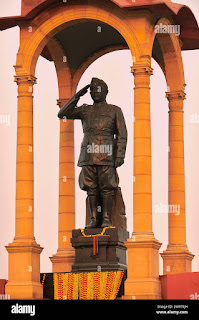Subhas Chandra Bose, affectionately called Netaji, was a maverick and played no less role than others in India’s struggle for independence. Bose's charisma, oratory skills, valor and revolutionary approach made him a legendary figure in Indian history. The Red Fort trials of INA soldiers garnered massive public support, highlighting his enduring influence on the Indian psyche. No doubt Netaji even this day remains a symbol of indomitable spirit and patriotism, inspiring generations of Indians.
Born on January 23, 1897, in Cuttack, Odisha, he was the ninth child of Janakinath Bose, an advocate, and Prabhavati Devi. A brilliant student, Bose topped the matriculation exams and graduated in Philosophy from Presidency College, Calcutta. Influenced by Swami Vivekananda, he exhibited an intense patriotic zeal early on.
Despite excelling in the Indian Civil Services examinations in England, he abandoned his career, deeply disturbed by the Jallianwala Bagh massacre in Punjab in 1919 committed by a maniac military officer Brig, Gen. Reginald Dyer, (the British government had let him out scot-free with mild punishment). So Bose returned to India to join the freedom struggle under Mahatma Gandhi.
.jpg) |
Patriot Subash Chandra Bose. you tube.com
|
Bose’s association with Deshbandhu Chittaranjan Das shaped his political ideology, and he quickly emerged as a dynamic leader within the Indian National Congress. He was jailed multiple times for his anti-British activities and became a prominent voice advocating for complete independence. Although admired for his organizational skills, Bose's uncompromising stand on immediate freedom often clashed with leaders like Nehru Gandhiji and others who stuck to gradualist approach. Bose realized Gandhiji's civil disobedience of Satyagraha was not the right tool with the atrocious British. To him Gandhiji was a pacifist. Despite the different with Ganhiji and his associates Bose was elected Congress President twice, in 1938 and 1939, but he resigned after differences with Gandhi’s faction that chose Pattabhi Sitaramaiah for the INC president post.
 |
| Patriot Chandra Bose's statue in New Delhi |
Above image : In Delhi a 28 foot tall statue of Netaji stands at the same place where his hologram statue was unveiled earlier in 2022 by PM Modiji. Below the canopy at the India Gate complex there stood a 50-foot marble statue of King George V until it was removed in 1968. PM Sri Modiji later unveiled (September 8) a black granite statue close to the National War Memorial. Indeed a fitting tribute to Netaji.
Following this, Bose formed the Forward Bloc to rally younger and more radical elements of the Congress One of this favorite Forward Block's front leaders was Muthu Ramalinga Thevar of Pasumpon who had consistently supported Bose; he too resigned from the Congress Party after the Wardha conference.
During World War II, Bose’s opposition to India’s involvement in the war on behalf of the British led to his imprisonment and eventual house arrest. In a dramatic escape in 1941, he traveled incognito to Germany, seeking Axis support for India’s liberation. Later, he reached Japan and took command of the Indian National Army (INA), comprising Indian soldiers captured by Japanese forces. In 1943, he established the Azad Hind Government and declared Andaman and Nicobar Islands as liberated territories, renaming them Swaraj and Shaheed Islands. The INA marched towards India, raising the battle cry "Delhi Chalo," and briefly entered Indian territory through Burma. In 1946 there instances in Punjab where Indian soldiers and Gurkhas sot dead British military officers reports were sent to then British PM Clement Atlee that revolt akin to 1857 rebellion was being groomed and it was tough for the British to face the angered Indian subcontinent. Churchill, Conservative party leader, not in power wanted England to retain India and he sought the help of USA. The then President Truman bluntlly refused to support Churchill and the retention of India by the UK.
However, the tides of war turned with Japan’s defeat following the bombings of Hiroshima and Nagasaki. The INA’s campaign was halted, and Bose reportedly planned to regroup in Tokyo. Tragically, he was believed to have perished in a plane crash in Taiwan on August 18, 1945, though his death remains shrouded in mystery. It was often reported that he was protected by Joseph Stalin till 1953 as the British were keen to try him for war crimes!
Bose’s legacy as a fearless leader and staunch patriot endures in the hearts of Indians. Hi+vs daring exploits, eloquence, and relentless pursuit of freedom inspired millions, making him a legend who continues to symbolize India’s quest for self-deter
https://discover.hubpages.com/education/Netaji-Honored-at-LastHis-Statue-will-Adorn-the-Canopy-at-India-Gate
https://indianexpress.com/article/explained/explained-culture/netaji-bose-statue-india-gate-grand-canopy-inauguration-modi-explained-8138401
.
.jpg)











